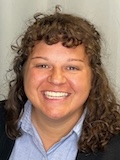Examining the Impact of Historical Policies on Health Disparities (Part 2 of 2)
March 20, 2025
12:00 PM - 1:00 PM (ET)
Webinar Details
Structural racism, embedded in unjust policies, has created and sustained poor social determinants of health thatcontribute to health disparities in the United States. These issues are deep, complex, and embedded in the history of our country. This can leave providers feeling overwhelmed as they work to address the residual effects that present as persistent chronic disease and premature death for many historically underrepresented groups. In this second of a two-part series, we will speak with experts in redlining, social determinants of health, and health disparities to understand how nurses can advocate for policy change to ameliorate health disparities and improve the health conditions for all people.
Outcomes:
- Identify at least one key area of health policy that can increase healthcare access.
- Verbalize key strategies to gain access to policy influencers.
- Verbalize at least one way to improve health outcomes and healthcare access at the local, state, and national levels.
This webinar is hosted by AACN’s Faculty Leadership Network.
Miss the first webinar in this series? View Part 1 webinar here.
Have questions prior to the webinar? Submit them here.
Note: Recording of the webinar will be available soon after the webinar airs. Visit AACN's On-Demand Webinars to watch.
Speakers
Speakers
 Felesia Bowen, PhD, DNP, PPCNP-BC, FAAN
Felesia Bowen, PhD, DNP, PPCNP-BC, FAAN
Professor and Associate Dean
University of Alabama at Birmingham School of Nursing
Dr. Felesia Bowen is Professor and Associate Dean at the University of Alabama at Birmingham School of Nursing. She is a decorated U.S. Army Nurse Corps veteran who earned her BSN at Tuskegee University, Master’s degree from Rutgers University, PhD from Columbia University, and DNP from Fairleigh Dickinson University, Teaneck, NJ. Dr. Bowen has devoted her career to improving health disparities and equity for children, their families, and the communities they live in. Dr. Bowen is known and respected for her unconventional and upstream approaches to addressing nursing workforce diversity. Dr. Bowen is a firm believer that student nurse diversity is necessary to decrease health disparities in minority and marginalized individuals. Dr. Bowen is a nationally certified primary care pediatric nurse practitioner and President-elect of the National Association of Pediatric Nurse Practitioners.
 Loretta T. Lee, PhD, RN, CRNP, FNP-BC, CNE, FADLN, FNAP
Loretta T. Lee, PhD, RN, CRNP, FNP-BC, CNE, FADLN, FNAP
Professor and Department Vice Chair, Family, Community and Health Systems
University of Alabama Birmingham School of Nursing
Dr. Loretta T. Lee, Professor and Vice Chair of the Department of Family, Community and Health Systems at the University of Alabama at Birmingham School of Nursing, is a leading figure in health policy advocacy and the healthcare industry. Her fellowships with the American Academies of Practice, the Academy of Diversity Leaders in Nursing, and her National Black Nurses Association Inc. Health Policy Committee chairmanship demonstrate her dedication to interprofessional education and advocating for health policies that will transform healthcare. Dr. L ee’s academic journey, from earning her PhD in 2012 to her BSN in 1986, has been a testament to her commitment to nursing and healthcare. As a nurse scientist, her scholarship and research center on advancing transformative health equity for historically marginalized populations. Dr. Lee is a board-certified family nurse practitioner, a National League for Nursing Commission for Nursing Education Accreditation program evaluator, and an associate editor for the international peer-reviewed journal Ethnicity and Health.

Joy Deupree, PhD, MSN, RN, WHNP-BC, FAAN
Professor Nursing Acute, Chronic & Continuing Care
University of Alabama at Birmingham School of Nursing
Dr. Joy Deupree is a board-certified women’s health nurse practitioner, educator, researcher and policy advocate. Her work has focused on reducing health disparities in rural and underserved areas of the South. In 2006, Dr. Deupree co-founded the Nurse Practitioner Alliance of Alabama (NPAA). Her advocacy for all nurses to practice to the full extent of their training and education led her to dedicate more than 10 years to NPAA leadership positions strategizing with stakeholders in Alabama to reduce barriers to practice and improve access to care. As president of the NPAA from 2012 to 2013, she championed numerous legislative and regulatory efforts that exponentially increased practice opportunities for NPs to improve access to care for rural Alabamians. Dr. Deupree was a faculty member in the UAB School of Nursing from 1999 to 2019, where she held numerous leadership positions, and in 2019, she relocated to the University of South Carolina College of Nursing, where she was a professor and Associate Dean for Practice Innovation, Partnerships. In 2023, she returned to the UAB School of Nursing and was a professor and Director of Health Policy Partnerships in the Office of Clinical and Global Partnerships from 2023 to 2024.
Lorna Finnegan, PhD, RN, FNP, FAAN
Dean and Professor
Loyola University Chicago
Lorna Finnegan joined Loyola University Chicago in 2019 as Professor and Dean of the Marcella Niehoff School of Nursing. She brings extensive experience in academic research, teaching, clinical practice, and leadership to her role. Dr. Finnegan earned her BSN, MS, and PhD from the University of Illinois Chicago (UIC) College of Nursing. Before joining Loyola, she held leadership positions at UIC, including Executive Associate Dean and Department Head. Earlier in her career, she served as the Founding Director of the Family Nurse Practitioner Program at Saint Xavier University in Chicago. She is also the past president of the National Organization of Nurse Practitioner Faculties, the leading organization dedicated to advancing quality nurse practitioner education. Her scholarship, clinical practice, and leadership focus on integrating big data analytics, strategic academic-practice partnerships, innovative teaching strategies, and policy-shaping leadership to enhance access to primary care and promote health equity among vulnerable and underserved populations. Dr. Finnegan has received National Institutes of Health funding for her research on symptom clusters in adults with multiple chronic illnesses and has been recognized with numerous awards for her contributions to teaching, research, and leadership. She has also served as a visiting scholar at universities in Thailand, South Africa, and South Korea.
Tags
Examining the Impact of Historical Policies on Health Disparities (Part 1 of 2)
February 27, 2025
12:00 PM - 1:00 PM (ET)
Presented by the Faculty Leadership Network
Webinar Details
Health disparities disproportionately impact individuals from historically underrepresented backgrounds and their communities. Institutional and structural racism undergird the conditions that perpetuate health disparities and make it easy to blame the affected for their poor health. Healthcare leaders and providers must understand the egregious, intentional, and unjust policies that have shaped the way for poor social determinants of health. The first of this two-part series serves as a primer to help providers understand the issue's complexity both across the nation and within their own communities.
Outcomes:
- Understand the etiology of redlining.
- Identify redlines within the communities they practice in.
- Explain how high prevalence health disparity issues in their community are connected to unjust policies.
- Develop strategies to incorporate the concept into their courses and curriculum.
Note: Recording of the webinar will be available soon after the webinar airs. Visit AACN's On-Demand Webinars to watch.
Speakers
Speakers
 Felesia Bowen, PhD, DNP, PPCNP-BC, FAAN
Felesia Bowen, PhD, DNP, PPCNP-BC, FAAN
Professor and Associate Dean
University of Alabama at Birmingham School of Nursing
Dr. Felesia Bowen is Professor and Associate Dean at the University of Alabama at Birmingham School of Nursing. She is a decorated U.S. Army Nurse Corps veteran who earned her BSN at Tuskegee University, Master’s degree from Rutgers University, PhD from Columbia University, and DNP from Fairleigh Dickinson University, Teaneck, NJ. Dr. Bowen has devoted her career to improving health disparities and equity for children, their families, and the communities they live in. Dr. Bowen is known and respected for her unconventional, and upstream approaches to addressing nursing workforce diversity. Dr. Bowen is a firm believer that student nurse diversity is necessary to decrease health disparities in minority and marginalized individuals. Dr. Bowen is a nationally certified primary care pediatric nurse practitioner and President-elect of the National Association of Pediatric Nurse Practitioners.
Tags
Code Rainbow: Addressing LGBTQ+ Allyship Among Rural Healthcare Providers
November 07, 2024
2:00 PM - 3:00 PM (ET)
Webinar Details
An hour-long webinar diving into the trials, tribulations, measures, and outcomes of piloting an LGBTQ+ cultural humility workshop in a rural Iowa hospital. Gabrielle Flynt and Mara Bennett-Deiss united over their passion for caring for the queer community. They created Code Rainbow: A Training for Healthcare Providers as an evidence-based practice implementation project while completing their Doctor of Nursing Practice degrees. Completing this project locally and measuring the outcomes led them to win Best Poster at the AACN Diversity Symposium poster fair in February 2024. As they finish their education, they hope to bring the training to many more healthcare providers nationwide in the future.
Outcomes:
- Improve allyship for queer people among healthcare providers.
- Improve knowledge about resources and organizations for sexual minority people in my area.
- Develop the skills necessary to provide support of sexual minority people.
- Increase awareness of policies in the workplace and/or community that affect sexual minority groups.
- Increase knowledge about sexual minority groups.
- Improve confidence to engage in conversations with LGBTQ+ people.
- Bring awareness to minority groups who are oppressed by society in the United States.
- Gain understanding of the social, health, and workplace barriers faced by queer individuals that are not faced by heterosexuals.
Note: Recording of the webinar will be available soon after the webinar airs. Visit AACN's On-Demand Webinars to watch.
Speakers
Speakers

Gabrielle Flynt, BSN
AGACNP-DNP Student
Winona State University
Gabrielle Flynt (she/her/hers) is a registered nurse in a rural northeast Iowa critical access emergency department and current Doctor of Nursing Practice Adult-Gerontology Acute Care Nurse Practitioner student at Winona State University, graduating in May 2025. She received her Bachelor of Science in Nursing from Washington State University in 2015. Originally from the inland northwest, employment opportunities for her spouse brought them to the rural Midwest, where they have resided for the last seven years. Passionate about improving healthcare for LGBTQ+ folks, she and her co-presenter Mara Bennett-Deiss co-created a workshop entitled Code Rainbow, designed to enhance allyship among healthcare providers. Initially a school assignment, Code Rainbow has blossomed into a passion project beyond their wildest dreams. It has taken them to several national nursing conferences to present their data and outcomes, including as a poster at the 2024 Midwest Nursing Research Society conference and as a podium presentation at the 2024 University of Iowa National Evidence-Based Practice conference. In February 2024, Code Rainbow: Addressing LGBTQ+ Allyship Among Rural Healthcare Providers won the best poster award at the AACN Diversity Symposium. Her interests outside of school and work include travel, gardening, playing fetch with her corgi, yoga, and spending time with her family.

Mara Bennett-Deiss, DNP
Nurse Practitioner Resident
Penobscot Community Health Center
Mara Bennett-Deiss was recruited to play soccer outside of her Michigan high school and received her BSN as a student athlete in 2016 from Lewis University in the suburbs of Chicago. After 8 years at the bedside in medical surgical, oncology, primary care, and rural settings, Mara attended Winona State University in Minnesota to complete her DNP and is an AANP board certified family nurse practitioner. Mar a characterizes her practice as a heartfelt blend of humor, transparency, and gentleness. With a fierce passion for serving marginalized communities, she prioritizes equity for all patients. Her philosophy centers on acceptance, ensuring that every individual feels acknowledged and respected. Passionate about improving LGBTQ+ healthcare, Mara co-created a workshop: Code Rainbow, with her co-presenter Gabrielle Flynt, to enhance allyship among healthcare providers. As a foster parent and avid volunteer, she strives to make a positive impact on her community. To unwind, Mara finds comfort in spending time with her dogs, game nights with friends, and is an avid sports enthusiast. With her kind nature, humorous disposition, and unwavering curiosity, Mara brings a unique and compassionate approach to her work and personal life.
Tags
Ethical Research: Navigating the Institutional Review Board (IRB) Process for Graduate Students
May 06, 2024
2:00 PM - 3:00 PM (ET)
Webinar Overview
This webinar will provide an overview of some of the concepts related to the Institutional Review Board (IRB) and ways to ensure ethical conduct and protection of human subjects in research. It will also guide and support graduate students in the steps of both writing and preparing a successful IRB application and how to respond to IRB clarifications. Lastly, a review of the indications to submit an IRB modification and any additional documentation needed that often accompanies an IRB submission will be discussed.
Objectives
- Understand the significance and role of the Institutional Review Board (IRB) in ensuring ethical conduct and protection of human subjects in research.
- Navigate the IRB process through a step-by-step process of preparing and submitting an IRB application, including required documentation and timelines.
- Discuss ethical principles in research that guide IRB review, such as informed consent, confidentiality, and minimizing risks to participants.
- Provide guidance on how to interpret and respond to IRB feedback, including clarifications and modifications, and ensuring clarity and alignment with ethical standards.
 This Webinar is hosted by the Graduate Nursing Student Academy (GNSA). For more information on the GNSA, visit www.aacnnursing.org/GNSA.
This Webinar is hosted by the Graduate Nursing Student Academy (GNSA). For more information on the GNSA, visit www.aacnnursing.org/GNSA.
Speakers
Speakers
Jennifer DiBenedetto, PhD, APRN, FNP-C
Assistant Professor, DNP Online Graduate Nursing Program
Nurse Scientist – Lahey Hospital and Medical Center
Regis College
Jennifer DiBenedetto is a T32 post-doctoral research fellow at Dartmouth Hitchcock Medical Center/Geisel School of Medicine at Dartmouth College conducting research related to burnout in nursing and primary care. She has had experience teaching Doctor of Nursing Practice Students at Regis College and is frequently involved in generating DNP projects and submitting to the IRB. She is also a nurse scientist at Lahey Hospital and Medical Center in Burlington, MA and works as a nurse practitioner in pediatrics in Northborough, MA.
Tags
Ethical Research: Navigating the Institutional Review Board (IRB) Process for Graduate Students
May 06, 2024
2:00 PM - 3:00 PM (ET)
Webinar Overview
This webinar will provide an overview of some of the concepts related to the Institutional Review Board (IRB) and ways to ensure ethical conduct and protection of human subjects in research. It will also guide and support graduate students in the steps of both writing and preparing a successful IRB application and how to respond to IRB clarifications. Lastly, a review of the indications to submit an IRB modification and any additional documentation needed that often accompanies an IRB submission will be discussed.
Objectives
- Understand the significance and role of the Institutional Review Board (IRB) in ensuring ethical conduct and protection of human subjects in research.
- Navigate the IRB process through a step-by-step process of preparing and submitting an IRB application, including required documentation and timelines.
- Discuss ethical principles in research that guide IRB review, such as informed consent, confidentiality, and minimizing risks to participants.
- Provide guidance on how to interpret and respond to IRB feedback, including clarifications and modifications, and ensuring clarity and alignment with ethical standards.
 This Webinar is hosted by the Graduate Nursing Student Academy (GNSA). For more information on the GNSA, visit www.aacnnursing.org/GNSA.
This Webinar is hosted by the Graduate Nursing Student Academy (GNSA). For more information on the GNSA, visit www.aacnnursing.org/GNSA.
Speakers
Speakers
 Jennifer DiBenedetto, PhD, APRN, FNP-C
Jennifer DiBenedetto, PhD, APRN, FNP-C
Assistant Professor, DNP Online Graduate Nursing Program
Nurse Scientist – Lahey Hospital and Medical Center
Regis College
Jennifer DiBenedetto is a T32 post-doctoral research fellow at Dartmouth Hitchcock Medical Center/Geisel School of Medicine at Dartmouth College conducting research related to burnout in nursing and primary care. She has had experience teaching Doctor of Nursing Practice Students at Regis College and is frequently involved in generating DNP projects and submitting to the IRB. She is also a nurse scientist at Lahey Hospital and Medical Center in Burlington, MA and works as a nurse practitioner in pediatrics in Northborough, MA.
